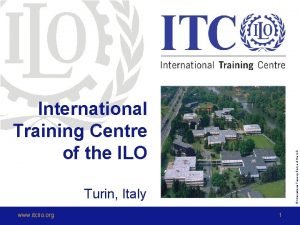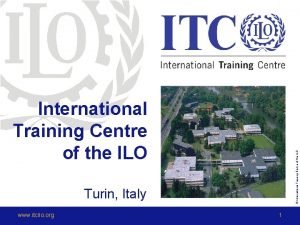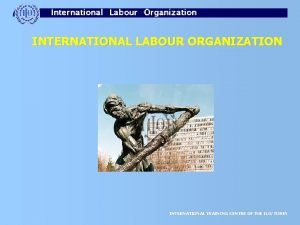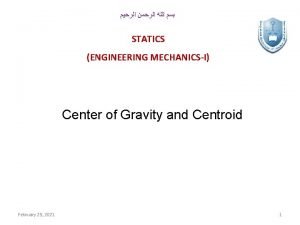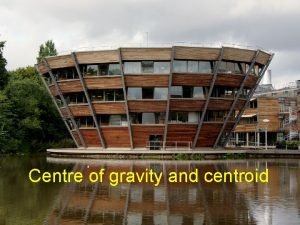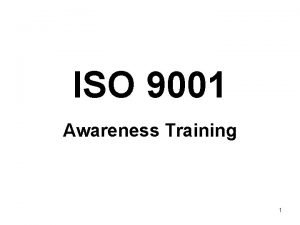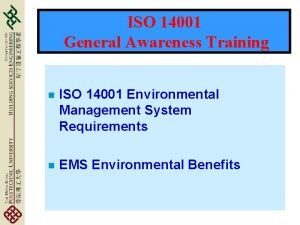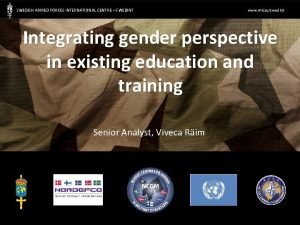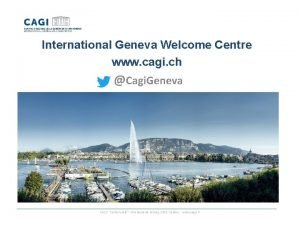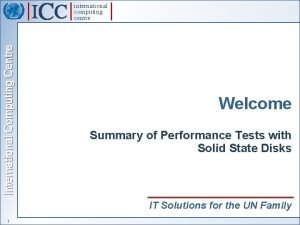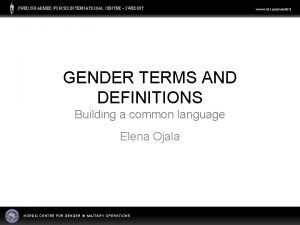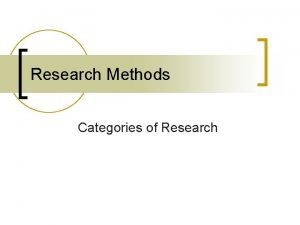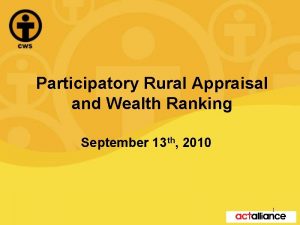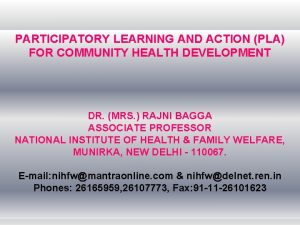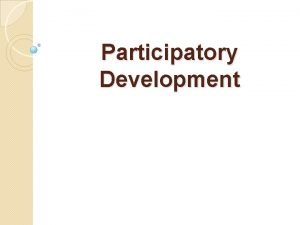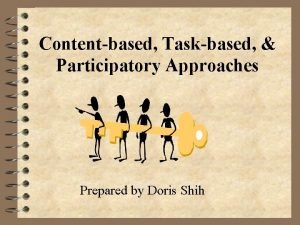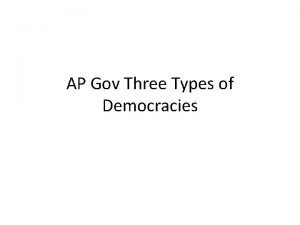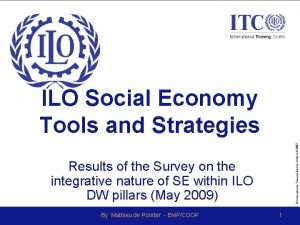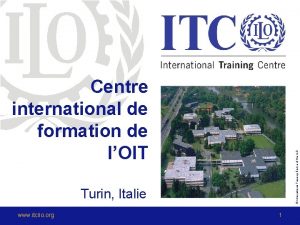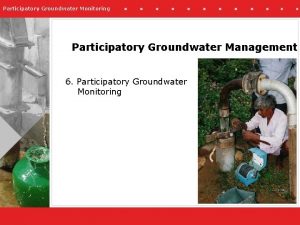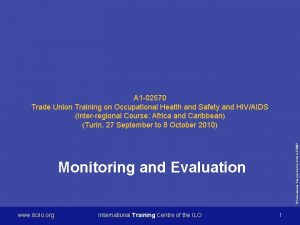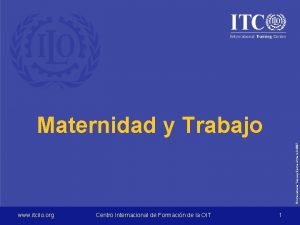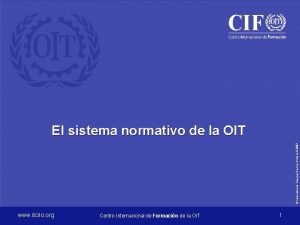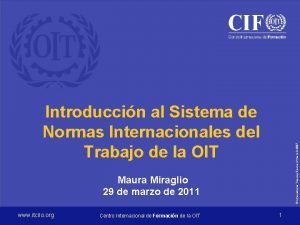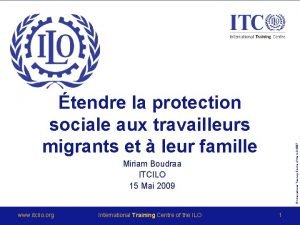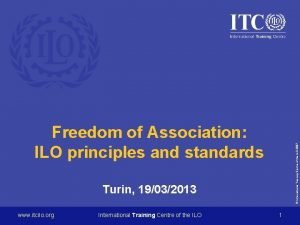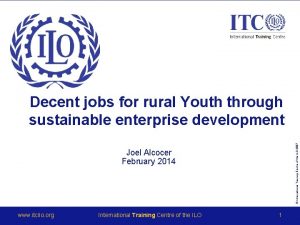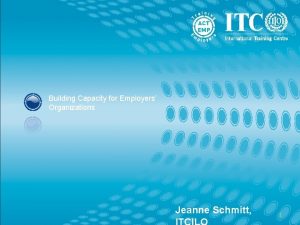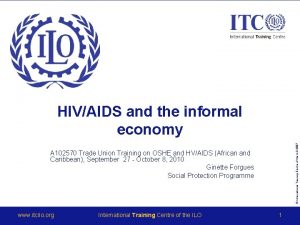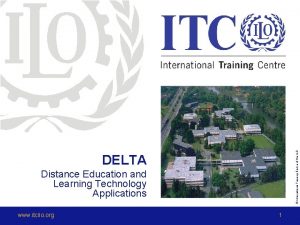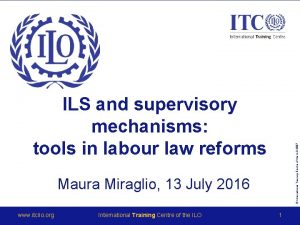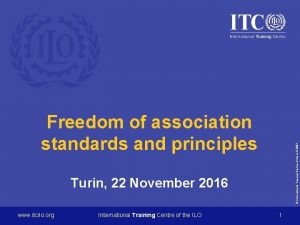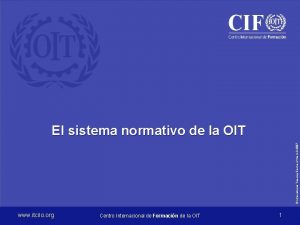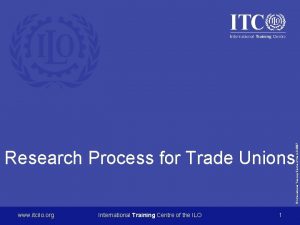International Training Centre of the ILO 2015 Participatory


























- Slides: 26

© International Training Centre of the ILO 2015 Participatory Labour Law Making: the role of social dialogue Inter-regional course: trade union strategies on the use of ILS in labour law reforms, ITCILO, 12/07/2016 www. itcilo. org International Training Centre of the ILO 1

Definition of Social Dialogue l Consultations l All types of Negotiations l Exchange of Information Among: n Representatives of Government, Employers, Workers on: of Common Interest Related to Economic and Social Policy www. itcilo. org International Training Centre of the ILO © International Training Centre of the ILO 2015 u. Issues 2

The forms of Social Dialogue l Bipartite l Tripartite + www. itcilo. org International Training Centre of the ILO © International Training Centre of the ILO 2015 l Tripartite 3

Levels of Social Dialogue l International l Regional l National © International Training Centre of the ILO 2015 l Sector/branches l Enterprise www. itcilo. org International Training Centre of the ILO 4

The ILO and Social Dialogue Premised on Strong Tripartite Organizations l Sustained High Level Dialogue l ILO, Pace Setter and Example of Tripartite Deliberations l Resolution on Tripartism and Social Dialogue: l n n l Valuable and Democratic Means Collaboration Among Government and Social Partners Modern and Dynamic Process © International Training Centre of the ILO 2015 n Government to Ensure Preconditions to Social Dialogue www. itcilo. org International Training Centre of the ILO 5

Pitfalls in Social Dialogue l Narrow l Lack vested interests, blocking reforms of basic agreement on economic analysis/prescription of democratic accountability and © International Training Centre of the ILO 2015 l Lack legitimacy www. itcilo. org International Training Centre of the ILO 6

Issues addressed by Social Dialogue 1 Macroeconomic policy framework and economic growth Structural change and transformation of the economy Wage increases and inflation; monetary policy Employment policy Educational and vocational training Productivity and economic competitiveness Taxation and fiscal policy Social welfare, security and protection Economic and social strategies to deal with externally originating pressures for reform l Labour migration www. itcilo. org International Training Centre of the ILO © International Training Centre of the ILO 2015 l l l l l 7

Issues addressed by Social Dialogue 2 settings, including minimum wage determination; l Labour legislation l Working conditions l Labour market policy l Labour dispute settlement l Occupational safety and health l… www. itcilo. org International Training Centre of the ILO © International Training Centre of the ILO 2015 l Wage 8

Benefits of Social Dialogue processes l Democratization of economic and social policy l Legitimacy and ownership l Reduce social conflicts l Ease social tensions during economic hardship © International Training Centre of the ILO 2015 making and transition periods www. itcilo. org International Training Centre of the ILO 9

Benefits associated with the results of Social Dialogue Sustainable economic and labour reform l Bringing the social dimension to the economic policy reform agenda l National economic and social progress © International Training Centre of the ILO 2015 l www. itcilo. org International Training Centre of the ILO 10

l Tripartite Consultation (International Labour Standards) Convention, 1976 (No. 144) l Consultation (Industrial and National Levels) Recommendation, 1960 (No. 113) l Freedom of Association and Protection of the Right to Organize Convention, 1948 (No. 87) l Right to Organize and Collective Bargaining Convention, 1949 (No. 98) 11 © International Training Centre of the ILO 2015 Main ILO Instruments related to tripartite social dialogue (1/2)

Consultations required by Convention 144 Involvement of workers’ and employers’ organizations in all measures taken in relation to ILO standards: Setting of new standards n Submission to Parliament n Ratification n Reporting on application n Denunciation © International Training Centre of the ILO 2015 n

Nature of consultations required by Convention 144 l Beyond mere information, but do not imply co-decision or consensus remain autonomous l Government remains responsible for the final decision © International Training Centre of the ILO 2015 l Parties

Nature of consultations required by Convention 144 (cont’d) Consultations must be effective Must take place before a decision is made l Parties must have the necessary information well enough in advance Must involve the most representative organizations. © International Training Centre of the ILO 2015 l

Recommendation No. 113 Consultation (Industrial and National Levels) Recommendation, 1960 (No. 113): consultation and cooperation between public authorities and employers’ and workers’ organizations © International Training Centre of the ILO 2015 l Effective

Recommendation No. 113 (cont’d) Consultation / cooperation aiming at: consideration of matters of mutual concern l To arrive, to the fullest possible extent at agreed solutions © International Training Centre of the ILO 2015 l Joint

Recommendation No. 113 (cont’d) Public authorities seek views, advice and support of employers’ and workers’ organizations in respect of: l Legislation affecting them l Functioning of national labour bodies l Plans of economic and social development © International Training Centre of the ILO 2015 Consultation / cooperation ensuring that:

Freedom of association and the right to collective bargaining include: The right of workers and employers to form and join organizations of their own choosing, and to do so without prior authorization; l The free functioning of those organizations; l The right to elect representatives in full freedom; l The right of organizations to organize their internal administration, and freely organize their activities and formulate their programmes; l The right to strike; l The right to form federations and confederations and affiliate to international organizations of workers and employers; l Protection against anti-union discrimination, and acts of interference; l The right to bargain collectively. © International Training Centre of the ILO 2015 l 18

l Labour Administration Convention, 1978 (No. 150) l Workers’ Representatives Convention, 1971 (No. 135) l Workers’ Representatives Recommendation, 1971 (No. 143) l Resolution concerning Tripartism and Social Dialogue, 2002 19 © International Training Centre of the ILO 2015 Main ILO Instruments related to tripartite social dialogue (2/2)

National legal basis for social dialogue institutions • A strong legal basis will help ensure that the institution is not dissolved as a reaction during a situation of hardship; • But no guarantee that social dialogue will succeed: commitment, sense of responsibility and trust are also essential; Government regulation • The government establishes the tripartite institution through a governmental or ministerial regulation following consultations with the social partners; Agreement among the parties • The government, along with employers’ and workers’ organizations reach an agreement to set up a tripartite social dialogue institution. © International Training Centre of the ILO 2015 National constitution or legislation • Advantage of providing for the rapid establishment of the institution; 20

Possible intensity of tripartite social dialogue at the national level High – most formal and binding form of social dialogue Negotiations (agreements by consensus) Low © International Training Centre of the ILO 2015 Consultations (more in -depth dialogue) Exchange of information 21

Types of tripartite social dialogue institutions Central – Specialised – Ad hoc bodies • Not necessarily attached to the government; • Various sizes and composition of membership; • Often tripartite “plus” or even with no government representation; • Address issues related to economic and social policies (beyond “world of work” stricto sensu). Tripartite Labour Advisory Councils National tripartite social dialogue commissions • Address issues related to national labour and employment policy (“world of work”) ; • Usually established to promote effective tripartite SD; to prevent and resolve collective labour conflicts of national importance or; to monitor the implementation of agreements; • Often established within the Labour or Employment Ministry. • Government often represented by several ministries of national importance; • Generally smaller in size than ESCs and often pure tripartite Specialized tripartite committees • Established to examine specific issues related to the world of work and beyond (e. g. health and safety at work, promotion of gender equality, wages…). • Stand-alone bodies or subunits of the main national tripartite institution; © International Training Centre of the ILO 2015 Economic and Social Councils • Established in an ad hoc manner for a short duration or a longer term. 22

Mechanisms ─ Examples of tripartite SD institutions Malawi South Africa Singapore Tripartite Commission for Socio. Economic Issues Tripartite Labour Advisory Council National Various Economic specialised Development and tripartite bodies Labour Council Very practical and operational tripartite “plus” form of tripartism body : ad hoc bodies are set up when needed on specific issues. Actors: Government and social partners Actors: Government, social partners + Community representatives © International Training Centre of the ILO 2015 Poland Actors: Government and social partners 23

Missions and mandate of tripartite institutions In most cases, the mandate of tripartite institutions will include some or all of the following options: l advice to government on policy issues: n analysis and development of policy initiatives n consultations on policy formulation and implementation n recommendations on economic, social and labour-related issues analysis and discussion of existing laws and programmes; negotiation of tripartite agreements, and supervision of their implementation; l administration of established policies; l public information sharing. © International Training Centre of the ILO 2015 l l The rules of procedure of tripartite institutions should specify the missions the tripartite institution may undertake on its own initiative & the ones that should only be fulfilled on request. 24

ILO member States with a National Tripartite Social Dialogue Institution (TNSDI) and/or an Economic and Social Council (ESC) (as of 2012) 60 50 40 38 30 10 0 23 29 4 16 Americas 11 7 6 Africa Arab States Countries with a TNSDI/ESC Asia and the Pacific © International Training Centre of the ILO 2015 20 45 6 Europe and Central Asia Countries with no TNSDI/ESC 25

Questions for discussions At what stage is your organization involved in labour law reform? l What kind of inputs is your organization in the position to give? l Is your organization in the position to discuss the purpose of the labour law reform? l To what extent are tripartite social dialogue institutions used in the labour law reform process? www. itcilo. org International Training Centre of the ILO 26 © International Training Centre of the ILO 2015 l
 Ilo turin
Ilo turin International training centre ilo
International training centre ilo International training center of the ilo
International training center of the ilo Adfelps
Adfelps Center of gravity statics
Center of gravity statics Centroids and center of gravity
Centroids and center of gravity Iso 9001:2015 ppt
Iso 9001:2015 ppt Iso 9001:2015 awareness training
Iso 9001:2015 awareness training Iso 14001 awareness
Iso 14001 awareness [email protected]
[email protected] Geneva welcome center
Geneva welcome center International computing centre
International computing centre Nordic centre for gender in military operations
Nordic centre for gender in military operations International pharmacovigilance centre
International pharmacovigilance centre Who programme for international drug monitoring
Who programme for international drug monitoring International centre for eye health
International centre for eye health Disadvantage of participatory planning approach
Disadvantage of participatory planning approach Quantitative research objectives examples
Quantitative research objectives examples Pra
Pra Wealth ranking in pra
Wealth ranking in pra Principles of pla
Principles of pla What is participatory development
What is participatory development Participatory budgeting in schools
Participatory budgeting in schools Participatory approach in development communication
Participatory approach in development communication Content based task based and participatory approaches
Content based task based and participatory approaches Participatory evaluation
Participatory evaluation Pluralist democracy
Pluralist democracy
